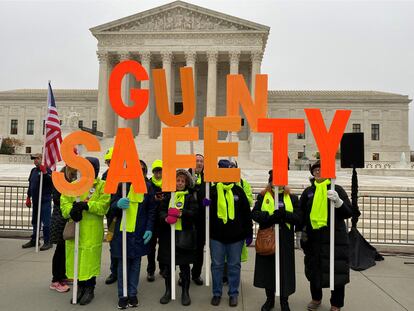The Supreme Court takes up a case that again tests the limits of gun rights
The court’s decision in the new case could have widespread ripple effects, including in the high-profile prosecution of Hunter Biden

The Supreme Court is taking up a challenge to a federal law that prohibits people from having guns if they are under a court order to stay away from their spouse, partner or other family members. The justices are hearing arguments Tuesday in their first case about guns since last year’s decision that called into question numerous gun control laws.
The federal appeals court in New Orleans struck down the law following the Supreme Court’s Bruen decision in June 2022. That high-court ruling not only expanded Americans’ gun rights under the Constitution, but also changed the way courts are supposed to evaluate restrictions on firearms.
Justice Clarence Thomas’ opinion for the court tossed out the balancing test judges had long used to decide whether gun laws were constitutional. Rather than consider whether a law enhances public safety, judges should only weigh whether it fits into the nation’s history of gun regulation, Thomas wrote.
The Bruen decision has resulted in lower-court rulings striking down more than a dozen laws. Those include age restrictions, bans on homemade “ghost guns” and prohibitions on gun ownership for people convicted of nonviolent felonies or using illegal drugs.
The court’s decision in the new case could have widespread ripple effects, including in the high-profile prosecution of Hunter Biden. The president’s son has been charged with buying a firearm while he was addicted to drugs, but his lawyers have indicated they will challenge the indictment as invalid following the Bruen decision.
The outcome probably will come down to the votes of Chief Justice John Roberts and Justice Brett Kavanaugh. They were part of the six-justice conservative majority in Bruen, but Kavanaugh wrote separately, joined by Roberts, to underscore that not every gun restriction is unconstitutional.
The case before the court involves Zackey Rahimi, who lived near Fort Worth, Texas. Rahimi hit his girlfriend during an argument in a parking lot and then fired a gun at a witness in December 2019, according to court papers. Later, Rahimi called the girlfriend and threatened to shoot her if she told anyone about the assault, the Justice Department wrote in its Supreme Court brief.
The girlfriend obtained a protective order against him in Tarrant County in February 2020. Eleven months later, Rahimi was a suspect in additional shootings when police searched his apartment and found guns. He eventually pleaded guilty to violating federal law. The appeals court overturned that conviction when it struck down the law. The Supreme Court agreed to hear the Biden administration’s appeal.
Rahimi remains jailed in Texas, where he faces other criminal charges. In a letter he wrote from jail last summer, after the Supreme Court agreed to hear his case, Rahimi said he would “stay away from all firearms and weapons” once he’s released. The New York Times first reported the existence of the letter.
Guns were used in 57% of killings of spouses, intimate partners, children or relatives in 2020, according to data from the federal Centers for Disease Control and Prevention. Seventy women a month, on average, are shot and killed by intimate partners, according to the gun control group Everytown for Gun Safety. A decision in U.S. v. Rahimi, 22-915, is expected by early summer.
Sign up for our weekly newsletter to get more English-language news coverage from EL PAÍS USA Edition
Tu suscripción se está usando en otro dispositivo
¿Quieres añadir otro usuario a tu suscripción?
Si continúas leyendo en este dispositivo, no se podrá leer en el otro.
FlechaTu suscripción se está usando en otro dispositivo y solo puedes acceder a EL PAÍS desde un dispositivo a la vez.
Si quieres compartir tu cuenta, cambia tu suscripción a la modalidad Premium, así podrás añadir otro usuario. Cada uno accederá con su propia cuenta de email, lo que os permitirá personalizar vuestra experiencia en EL PAÍS.
¿Tienes una suscripción de empresa? Accede aquí para contratar más cuentas.
En el caso de no saber quién está usando tu cuenta, te recomendamos cambiar tu contraseña aquí.
Si decides continuar compartiendo tu cuenta, este mensaje se mostrará en tu dispositivo y en el de la otra persona que está usando tu cuenta de forma indefinida, afectando a tu experiencia de lectura. Puedes consultar aquí los términos y condiciones de la suscripción digital.








































